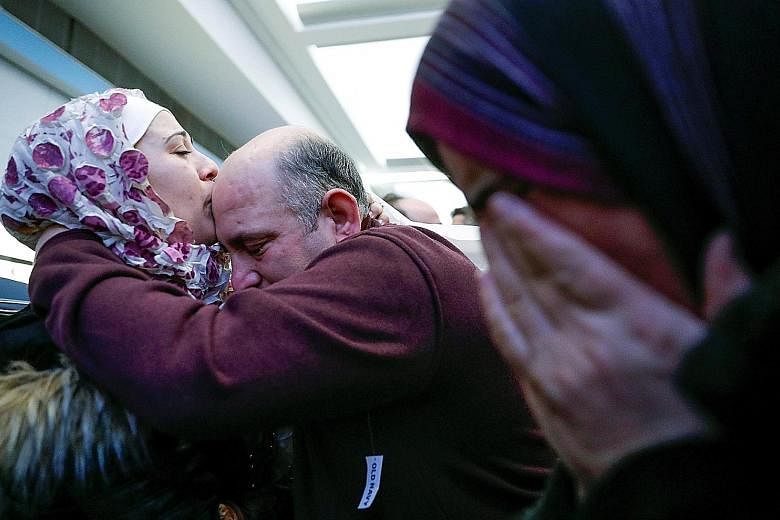United States President Donald Trump's executive order barring refugees from entering the US for 120 days, a 90-day ban on travellers from seven Muslim-majority countries and an indefinite ban on refugees from Syria had been seen by some as a ban targeting Muslims.
That perception seems to be borne out by data showing that Muslim refugees from the seven countries - Somalia, Sudan, Libya, Iraq, Iran, Syria and Yemen - will be disproportionately hit by the ban.
A total of 38,901 Muslim refugees entered the US in the 2016 fiscal year, accounting for 45.7 per cent of the total refugee inflows that year. This was the highest number of Muslim refugees allowed into the US in any recorded year.
Refugees from the seven affected countries - before a US district judge halted the ban last Friday in a move now being challenged by the Trump administration - accounted for 79.4 per cent of the inflows. Syria, Somalia and Iraq alone accounted for 75 per cent of the Muslim refugees who entered the US in 2016.
If the Trump administration succeeds in getting the ban reinstated, it is likely that the Muslim refugee intake in the US would fall by a commensurate level.
Nevertheless, while Muslims make up the largest religious group affected by the immigration order, large numbers of Christians and people of other religious beliefs will also be hurt by the controversial move.
The number of Christian refugees entering the US was almost at the same level as Muslims in 2016, at 37,521. Accounting for 44.1 per cent of the refugees, it was the first time since 2006 that Christians represented a smaller proportion of the refugee population entering the US than Muslims. But Christian refugees from the seven countries affected by the ban accounted for only 11.4 per cent of the total number of Christian refugees entering the US in the 2016 fiscal year.

Also, the argument that Mr Trump has imposed a ban targeting Muslims does not hold up in the case of Iran. The number of Christians and people of other beliefs entering the US as refugees from Iran has consistently exceeded the number of Muslims over the past seven years.
In fact, data shows that the US had been restricting the inflow of refugees in the years before 2016, when President Barack Obama, in the last year of his term, decided to increase the intake.
The US humanitarian response to the war in Syria and Iraq, for instance, has been muted, as evidenced by the number of refugees allowed into the country from Syria.
In 2010, a year before civil war broke out in Syria, the US admitted 73,311 refugees from across the globe. But in 2011, the number fell by 23 per cent. It subsequently rose to 69,926 by 2013 and stayed more or less at that level for the next two years before hitting a 17-year high of 84,995 in 2016.
However, it appeared that the US did not consider Syrians trying to flee their war-torn country to be suitable candidates for immigration. Only 29 Syrians were allowed into the US in 2011, 31 in 2012, and 36 in 2013. Their numbers rose to 105 in 2014 and then jumped more than tenfold to 1,682 in 2015.
It was not until Mr Obama pledged to admit 10,000 more Syrian refugees in 2016, in response to growing pressure at home and from overseas for the US to do more, that there was a significant uptick in arrivals.
Following Mr Obama's decision, data shows that Syrian refugee entries into the US rose to 12,587, or 14 per cent of total refugee arrivals in 2016, the second-highest from any country that year. Almost all the refugees from Syria were Muslim.
In sharp contrast, many countries in Europe and the Middle East have opened their doors to Syrian refugees fleeing war and persecution. The latest data from the UN High Commissioner for Refugees shows that Turkey has taken in 2.9 million Syrian refugees, Lebanon another million and Jordan 664,000 since the start of the conflict. The European Union took in more than 844,000 Syrians, according to Eurostat, with more than half of them given shelter in Germany.


